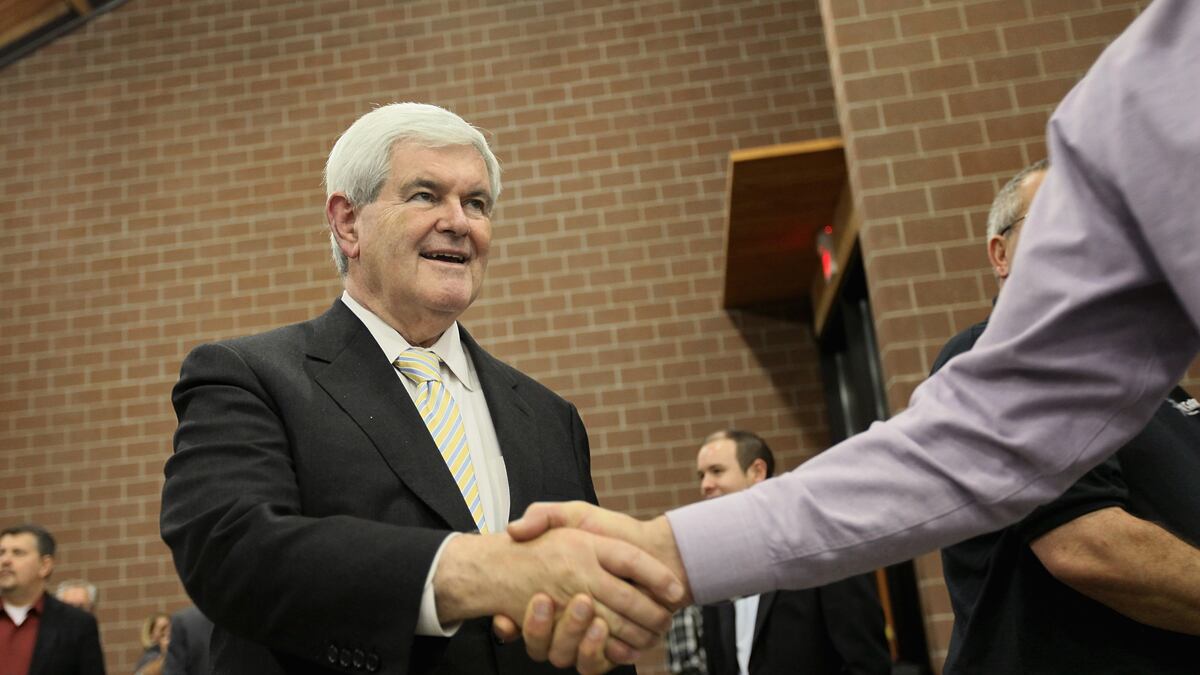Political cognoscenti who’ve been waiting for the inevitable collapse of the currently surging Newt Gingrich campaign should get ready for a very long wait: in the last few days, the former speaker has demonstrated a surprising ability to turn presumed setbacks and weaknesses to his own electoral advantage.
He may not count as a legitimate or durable frontrunner, let alone a sure-thing nominee, but it looks increasingly likely that he’ll remain a significant factor in the race and play the role of Mitt Romney’s most credible and formidable rival.
The most recent polls show Gingrich not only as the most popular candidate among Republicans across the country, but with significant leads in both Iowa and South Carolina, while emerging as Romney’s only serious competition for the nation’s first primary in New Hampshire. The all-important New Hampshire Union Leader, that state’s dominant newspaper, provided Gingrich with a powerful endorsement, and most observers expect him to continue to build support before the primary, six weeks from Tuesday.
According to conventional wisdom, three factors render Newt patently unelectable. On two of the three, he may be able to turn his supposedly fatal flaws into benefits for his highly unconventional campaign.
His immigration “heresy” is more likely to help than to hurt him.
At last week’s Washington debate, Gingrich boldly defended the idea that undocumented immigrants who’ve lived in the country for many years and established deep roots in the United States ought to be allowed to earn legal status, but not citizenship, to continue living and working in the United States. That mainstream-media commentators suggested Newt damaged himself with this common-sense approach merely reflects their belief that most Republicans are crazy—or at least deeply demented on this issue. Numerous polls show that big majorities, including majorities of self-identified Republicans, support some limited path to legal status for the most responsible and constructive of the country’s 12 million residents who entered without authorization.

While Rick Perry certainly damaged his faltering campaign with his attempt to defend the Texas policy of in-state tuition for children of illegals, it was the feeble nature of that defense, not the essence of the policy itself, that damaged him most. Four years ago—with immigration a much bigger public concern, according to the polls, than today—Mike Huckabee used a televised debate to argue for his own (unsuccessful) effort to provide in-state tuition to children of illegals who had spent their school years in Arkansas. His campaign went on to a decisive triumph in Iowa and later primary victories in other deeply conservative states.
Although most analysts cast Newt’s immigration comments as a seat-of-the-pants mistake, it’s at least worth considering the possibility that he carefully planned the remarks in order to sharpen contrasts with Mitt Romney. On the one hand, Gingrich takes a seemingly controversial position as a matter of conscience and courageously sticks with it; on the other, Romney, who fully supported a path to legalization as recently as 2007, takes a demagogic anti-immigration position and on this issue looks like a shifty opportunist. No wonder Gingrich seems to have gained recent traction, despite all the pronouncements from the punditocracy about his imminent demise.
Newt’s flip-flops look like pragmatism in service of governance, while Mitt’s look like opportunism in pursuit of votes.
With Romney taking heat from every direction for his many reverses and reconsiderations, it seemed only a matter of time before Gingrich drew withering fire of his own for an even more prolific record of ideological alteration. After all, in nearly 35 years in public life, Newt has changed his thinking on everything from climate change to health-care mandates, accumulated embarrassing footage of now disregarded bipartisan initiatives with the likes of Nancy Pelosi and Hillary Clinton, and even switched his personal religious faith from Baptist to Catholic. Why, then, has the flip-flopper label attached itself so much more firmly to Romney than to the equally flexible Gingrich?
The answer involves both context and style. Romney never tires of reminding the public that he spent most of his life as “a conservative businessman,” but ever since his failed Senate race in 1994, he’s also been a high-profile candidate for public office. The changes in his positions involved his pitches for votes, not his decisions in governance: he held an elective post for a mere four years. Newt, on the other hand, served 20 full years in Congress and engaged in the give-and-take, the daily deals and compromises, that represent the heart and soul of the legislative process. He can say that many of his switcheroos arose from the demands of governance rather than a bid for votes; after all, since his first election to the House in 1978, he never faced a fiercely competitive race for reelection.
Moreover, Newt can defend his sometimes capricious leadership, especially as House speaker, with an unquestioned record of conservative accomplishment, including balanced budgets and sweeping welfare reform. Romney can point to his own effective leadership during a single gubernatorial term, but it hardly helps that his most notable accomplishment involved health-care reform, which most Republicans despise.
Most of Mitt’s embrace of more conservative ideas occurred only after he left public office and began running for president, while Newt had already earned the reputation of a pugnacious conservative during his time in Congress. Moreover, the sheer volume of Newt’s writing on public issues, with more than two dozen published books and hundreds of observations and proposals and eight-point plans on every imaginable national challenge, makes it impossible to associate him with the measurable, unmistakable center-to-right journey of Mitt Romney.
Newt’s complicated trajectory over the years involves left-to-right, up-and-down, back-to-front, and sideways-to-detours-to-over-easy. He never pretends that he’s been anything other than changeable, constantly looking for exciting, novel, fresh approaches. Yes, he’s professorial, provocative, and often pompous, but the visible rough edges will make folks less likely to fear that he’s selling you a phony bill of goods than the suave, perfectly calibrated presentations of the freakishly self-possessed Mitt. The public may not like a professor any better than it likes a salesman, but it's less likely to feel suspicious about the academic’s inconsistencies.
Newt’s private peccadilloes will prove the most difficult aspect of his public personality to turn to his advantage.
According to some of Newt’s most committed supporters, even his obvious foibles and failures will end up making him more endearing to the public at large. “Just look at the contrast when he stands on the stage next to Romney,” one Gingrich enthusiast told me. “Mitt is perfect—fit, athletic, well groomed, every hair in place.
“Then there’s Newt: a big zhlub who waddles when he walks. If every American who looks like Mitt votes for Mitt, and everybody who looks like Newt votes for Newt … we win in a landslide.” By the same token, Gingrich true believers argue that even Newt’s marital problems can work for him: Mitt and Ann Romney have enjoyed 42 years of apparently blissful marriage, with 16 beautiful grandchildren and the sort of personal perfection that most Americans envy but can hardly emulate. Newt, on the other hand, with two failed marriages, and two angry ex-wives who have unloaded on the media, resembles a bigger slice of the public that hopes to overcome problematic pasts for wholesome fresh starts—like Newt’s purportedly hyper-romantic union with Callista for the past decade.
This logic may work with some male conservatives, but it seems doubtful that most women will buy it, especially when Newt’s colorful personal history, including his affair with Callista when she was on the House payroll, is contrasted with gauzy treatment for the ongoing partnership of Barack and Michelle Obama.
One of the biggest advantages for Republicans is that most Americans strongly prefer conservative values for themselves and for their families. One of the biggest problems for Republicans is that the personally likable Obamas look like fine representatives of those family values. Americans like Obama’s personality far more than they like his policies, and with the Democrats certain to highlight the likability issue as much as they possibly can, Newt looks particularly vulnerable, offering a less effective counterweight to this approach than the disgustingly wholesome and reassuringly old-fashioned Romneys.
If Gingrich continues to surge in the weeks before Iowa, and manages to assemble, for the first time, some signs of credible, on-the-ground organization in the early primary states, his desperate opponents will likely probe for vulnerability with a searing new focus on personality and private life. Movement conservatives may resent such distractions from the crucial issues of the campaign, but if Gingrich can continue to transcend his own weaknesses and win the nomination, he’d best prepare for even more punishing attention from the president and his battle-hardened legions.






